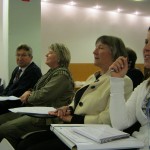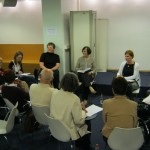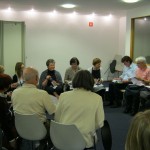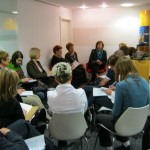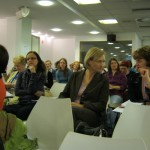The intergenerationally conceived meeting was attended by more than 50 participants, members of the Slovene Third Age Universities Network and volunteers, active in the field of preservation of Slovene cultural and natural heritage.
In the introductory part several examples of good practice in the field of cultural and natural heritage preservation were presented (cleaning of the river Ljubljanica project, promotion of traditional, heritage respecting farms, research into chapel building in a rural area, development of villages to promote tourism), together with the research and project methodologies employed. The speakers emphasized the importance of network building and the positive effects of their work on local environments (inclusion of children in protection of national heritage, strengthening of identity, increased participation in local governments and administration, improved cooperation between villagers, creation of new jobs, etc.). The methodology of these projects can serve as a model in other rural areas in Slovenia and abroad.
In the second part one group of participants discussed tangible and intangible cultural heritage. They talked about the objects that marked their lives and those of their children. Further, they discussed what specimens of architectural heritage in their environments should be protected and how telling and recording life stories of the people living in the same environment can contribute to strengthening of local and regional identities. The participants suggested a number of cultural heritage centred programmes for older people:
- writing digital life stories,
- recording the happiest childhood memories, the most horrible teenage memories, the most powerful memories of the people in later years,
- recording life-stories of local people as a connecting factor and a basis for development of tourism in a locality,
- recording oral history of a street, community, place,
- recording of traditional crafts
- understanding cultural tourism.
Two groups of participants discussed the issues connected with identity. Below are some of their ideas:
- Personal identity – just as local, regional and national identity – . is not something firm and lasting, it changes and is transformed with the changing circumstances.
- The problem of the modern society is the »eternalness« of the present time. The young possess no referential framework, they have no anchor. Without memories – the understanding of one’s past – and a look into the future, it is not possible to build a firm identity.
- Without building a strong personal identity, it is not possible to enter into meaningful relationships with other people. Without building a strong national identity, it is not possible to accomplish a successful integration in Europe.
- What are the typical features of Slovene people? Are we- surrounded by stronger and more numerous neighbours, enclosed in narrow Alpine valleys- defined by genetic, historical and geographical factors ? Are we (still exceedingly) hard-working, (too) helpful in foreign environments, (too)rigid/ straightforward in stating our opinions , not tactful and diplomatic enough, overly pessimistic, suicidal? Why don’t we show respect for our national symbols, why don’t we fly our flag and attend our national celebrations?
- The older generations still feel stronger links with the former republics of Yugoslavia than with the European Union. In Dubrovnik we feel more at home than in Paris. The younger generations’ identity is more global than European. Young professionals tend to form virtual global expert communities.
- The older generations grew up in the time of faith in science, progress and welfare for all. We grew up in the time of relative economic safety (lifelong employment). We must not pass the crippling fear we are experiencing in the present time of economic uncertainty and unpredictability on to our children and grandchildren. In order to survive they have to develop firm but flexible personalities. On the »heroic« journey they have to make to form their identity, they need to have courage, many challenges to gain experience, and a great deal of love.



